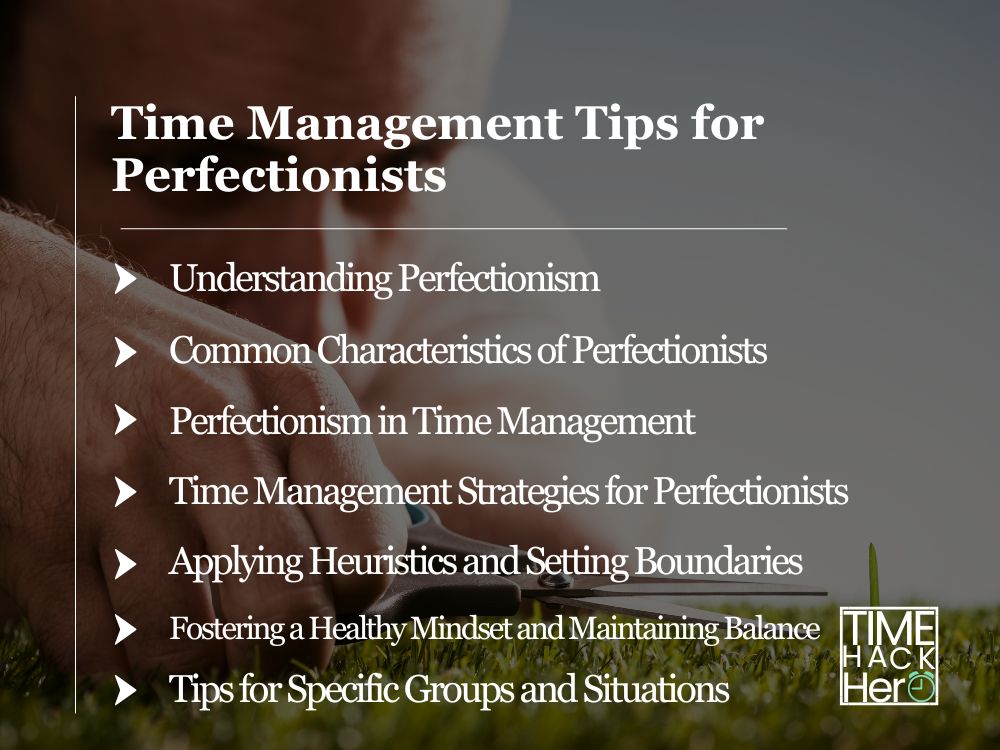Perfectionism can be a double-edged sword. On one hand, it drives individuals to strive for excellence and high-quality results; on the other, it can lead to excessive amounts of time spent on tasks, making it difficult to manage time effectively. As a perfectionist, finding the balance between producing high-quality work and managing time efficiently is crucial for personal and professional success.
The key to striking this balance lies in adapting time management strategies tailored specifically to address the unique challenges faced by perfectionists. By understanding the underlying tendencies that drive perfectionism and learning to navigate them effectively, individuals can overcome the potential pitfalls of this personality trait and maximize productivity.
This article will explore time management tips and techniques specifically designed for perfectionists to help them find the right balance, avoid procrastination, and perform at their best. By implementing these strategies, perfectionists can transform their pursuit of excellence into a powerful asset rather than a hindrance.
Table of Contents
Understanding Perfectionism
The Roots of Perfectionism
Perfectionism can be understood as the constant striving for flawless performance and high standards. It is often rooted in an individual’s beliefs about self-worth and their need for control in various aspects of life. Such beliefs may stem from early childhood experiences, where praise and approval were often contingent on achieving high standards or avoiding criticism. Fear and anxiety are closely linked to these thought patterns, as perfectionists may believe that making mistakes will result in negative consequences or even rejection from others.
Perfectionism and Mental Health
Perfectionism can have a significant impact on an individual’s mental health. Aiming for high standards is a healthy pursuit of excellence, but perfectionism may lead to stress, anxiety, and even depression when unrealistic expectations are not met. In the pursuit of perfection, people may procrastinate excessively, fearing that the outcome of their actions will not meet their high standards. This can create a vicious cycle, as procrastination may result in missed deadlines or increased workload, further exacerbating stress and anxiety. Moreover, strained relationships may develop as a result of the perfectionist’s rigid expectations and constant need for control.
| Mental Health Issue | How it Relates to Perfectionism |
|---|---|
| Stress | Constant striving for high standards can lead to overwhelming pressure and stress. |
| Anxiety | Fear of failure or criticism can cause feelings of worry and tension. |
| Depression | Perceived inability to meet unrealistic standards can result in a sense of worthlessness. |
Positive and Negative Aspects of Perfectionism
While perfectionism can have negative consequences on mental health and relationships, it is also important to acknowledge the positive aspects. Perfectionists often possess a strong work ethic, attention to detail, and dedication to achieving their goals. These qualities can lead to professional excellence and personal growth. The key lies in finding a balance between maintaining high standards and recognizing that it is human to make mistakes or fall short at times.
- Positive Aspects: strong work ethic, attention to detail, dedication.
- Negative Aspects: stress, anxiety, procrastination, strained relationships, unrealistic expectations.
In conclusion, understanding the origins and aspects of perfectionism helps in managing its associated challenges. By acknowledging both the positive and negative aspects, individuals can work towards finding a healthy balance between setting high standards and accepting their human imperfections.
Common Characteristics of Perfectionists
High Achievers vs. Perfectionists
High achievers and perfectionists may seem similar at first glance, but there’s a distinction between the two. High achievers focus on setting challenging but attainable goals, and they usually gain satisfaction from working towards and achieving their objectives. Conversely, perfectionists set unrealistically high expectations and can experience dissatisfaction or self-blame if they don’t meet those standards. This unrelenting quest for perfection can hinder decision-making and negatively impact productivity.
Perfectionist Tendencies in Various Fields
Perfectionism can manifest in several fields or aspects of life, including:
- Workplace: Perfectionists can be extremely detail-oriented and demanding in the workplace. Their inability to delegate effectively or accept minor flaws may lead to decreased efficiency and burnout.
- Education: Academic perfectionists may obsess over their grades, striving for flawless performance in their courses. This approach can be counterproductive and hinder learning and creativity.
- Personal relationships: In interpersonal relationships, perfectionists might hold themselves and others to excessively high standards, leading to emotional distress and conflict.
- Health and fitness: Perfectionists may impose strict exercise regimens or diets, often ignoring their body’s needs and putting their physical or mental health at risk.
| Field | Perfectionist Traits |
|---|---|
| Workplace | Extremely detail-oriented, demanding, struggles with delegation |
| Education | Obsession with grades and flawless performance |
| Personal Relationships | High standards for self and others, potential emotional conflicts |
| Health and Fitness | Strict regimens, potential harm to physical or mental well-being |
Understanding these common characteristics of perfectionists can be valuable in identifying and managing perfectionist tendencies with the goal of fostering a more balanced approach to success and satisfaction.
Perfectionism in Time Management
The Impact on Productivity
Perfectionists often strive to produce work of the highest quality, which can lead to high productivity in some cases. However, this obsession with perfection can also hinder productivity, as perfectionists may:
- Spend excessive time on tasks, focusing on minute details
- Experience difficulty delegating tasks, fearing that others may not meet their high standards
- Procrastinate due to the overwhelming pressure to produce perfect results
These patterns can result in reduced overall productivity and increased stress levels, while also potentially affecting the overall wellbeing of the individual.
Opportunity Cost
Perfectionism in time management can lead to significant opportunity costs. Perfectionists may miss out on valuable experiences, growth opportunities, and achievements due to their preoccupation with:
- Completing tasks to an excessively high standard
- Spending too much time fixing minor mistakes
- Avoiding taking risks or trying new things for fear of failure or imperfection
It’s essential for perfectionists to learn how to balance their commitment to excellence with the recognition that time and resources are limited, and that making mistakes is a natural part of growth and development.
Time Wasted
The perfectionist’s focus on every detail may seem admirable; however, it often leads to wasted time. As a result, they may:
- Struggle to prioritize tasks effectively, attempting to give equal attention to both important and less important tasks
- Frequently re-work or revise projects, even when the changes provide marginal improvements
- Experience lower motivation over time due to the unattainable goal of constant perfection
To improve time management, perfectionists should strive to practice self-awareness in recognizing and addressing unproductive patterns. By doing so, they can learn to focus on high-priority tasks and find a balance between striving for quality and making efficient use of their time.
Time Management Strategies for Perfectionists
Setting Realistic Goals
Setting realistic goals is a crucial step in efficient time management for perfectionists. It’s essential to evaluate your abilities and resources to create a practical plan. Being realistic means avoiding setting overly ambitious goals that may cause unnecessary stress and difficulty achieving them. Break down your objectives into smaller, manageable steps and celebrate your progress as you go.
Prioritization and To-Do Lists
Creating a prioritization system and structuring your to-do list can significantly improve your time management skills.
- Identify the most critical tasks to complete
- Allocate a specific time frame for each activity
- Regularly check and update your to-do list to stay organized
A well-structured to-do list allows you to focus on what matters most and can help prevent getting caught up in minor, less important details.
Breaking Down Tasks
Breaking down tasks into smaller components is an efficient approach to managing complex projects. This process can help you distribute and manage your workload more effectively by working towards achievable milestones.
- Create a checklist for each task
- Define the steps required to complete each activity
- Track your progress and celebrate small victories
Addressing Procrastination
Procrastination is a common issue among perfectionists. To address this problem, consider using problem-solving techniques and time management tools:
- Dedicate specific time blocks for tasks
- Use timers or apps to limit distractions
- Set personal deadlines and stick to them
- Reward yourself for meeting deadlines
Embracing Imperfection
Perfectionists often struggle with the notion that “good enough” is never enough. However, embracing imperfection is necessary for effective time management. Remind yourself that it’s acceptable to occasionally make mistakes and that it’s essential to learn from them. By doing so, you can reduce stress and focus on the process rather than striving for unattainable perfection.
Applying Heuristics and Setting Boundaries
Using Heuristics for Decision-Making
Heuristics are mental shortcuts or rules of thumb that can make decisions more efficient, and they can be particularly useful for perfectionists. Instead of getting stuck analyzing every detail, applying heuristics can help prioritize tasks and speed up decision-making, especially when there is limited information or time. Some examples of useful heuristics include:
- The 80/20 Rule: Focus on the 20% of tasks that will deliver 80% of the results.
- The 2-Minute Rule: If a task takes less than 2 minutes, do it immediately.
- The Eisenhower Matrix: Classify tasks into four quadrants based on urgency and importance.
By creating habits around using heuristics, perfectionists can optimize their time management and reduce the risk of getting bogged down in less important details.
Saying No and Delegating Tasks
Another essential skill for perfectionists is learning to say no and delegating tasks to others. Saying no can be difficult, but it’s crucial for time management and setting boundaries. Some points to remember when saying no include:
- Be polite but firm
- Explain the reason for declining if appropriate
- Offer an alternative if possible
- Don’t over-apologize or justify
In addition to saying no, delegating tasks is a valuable skill that can help alleviate the pressure to handle every detail personally. To effectively delegate:
- Identify tasks that can be delegated
- Choose the right person for the task
- Provide clear instructions and expectations
- Be available for questions and feedback
- Monitor progress and provide feedback when necessary
By learning to say no and delegate tasks, perfectionists can better prioritize their workload and focus on what matters most.
Fostering a Healthy Mindset and Maintaining Balance
Managing Stress and Anxiety
Perfectionists often experience stress and anxiety due to the pressure to achieve top-quality work. To manage these emotions, it’s essential to identify the root cause and find ways to cope effectively. Some strategies include:
- Prioritizing tasks and setting realistic goals
- Practicing mindfulness and relaxation techniques
- Engaging in activities that bring joy and promote a state of flow
Building Self-Worth
It’s crucial for perfectionists to develop a healthy sense of self-worth that isn’t solely reliant on accomplishments. To build self-worth, consider the following:
- Recognize your inherent value as a person, regardless of achievements
- Challenge negative self-talk and replace it with positive affirmations
- Focus on personal growth and wellbeing instead of fixating solely on goals
Developing a Support System
Having a strong support system can help perfectionists maintain balance and prevent extremes in behavior. This support can come from different sources, such as:
- Friends and family who provide encouragement and understanding
- Mentors or therapists who offer guidance and intervention when needed
- Connecting with others who share similar experiences, such as through support groups or online communities
Parents play a significant role in fostering a healthy mindset for their children. Encouraging open communication and offering emotional support can help combat perfectionistic tendencies. As noted by Alice Boyes, it’s essential to instill the importance of balance and prevent perfectionism from consuming one’s life.
Tips for Specific Groups and Situations
College Students and Perfectionism
College students often face immense pressure to perform well in their academics. Perfectionism in this environment can lead to burnout and a negative impact on overall mental health. Here are some tips to help college students manage their perfectionist tendencies:
- Set realistic goals: Recognize that it’s impossible to achieve perfection in every aspect of college life. Focus on specific, attainable goals instead.
- Create a balanced schedule: Make sure to allocate enough time for self-care, socializing, and rest. This helps maintain overall well-being and reduces the stress associated with perfectionism.
- Practice self-compassion: Understand that it’s okay to make mistakes and not be perfect. Treat yourself with kindness when things don’t go as planned.
Perfectionism in the Workplace
Perfectionism can hinder productivity and create unnecessary stress in the workplace. Here are some strategies for managing perfectionism in a professional setting:
- Prioritize tasks: Focus on the most important tasks first, and let go of the need to make every detail perfect. Recognize that doing a good job is often more important than delivering a perfect result.
- Delegate responsibilities: Trust your colleagues to handle some tasks and ease your workload. This will help you focus on your priorities and manage time more effectively.
- Accept feedback: Be open to constructive criticism and use it as an opportunity for growth and improvement, rather than seeing it as a threat to your perfectionism.
Managing Perfectionism as a Parent
Parents with perfectionist tendencies may unintentionally pass them on to their children. Here are some tips for managing perfectionism as a parent:
- Model healthy behavior: Show your children that it’s okay to make mistakes and learn from them. Encourage a growth mindset, focusing on effort and progress rather than perfection.
- Set realistic expectations: Avoid putting unnecessary pressure on your children to meet unrealistic standards. Support their interests and strengths, and empower them to explore their own paths.
- Foster a healthy environment: Create a home where everyone feels accepted and loved, regardless of achievements or performance. This contributes to a lower-stress atmosphere and helps children develop a healthier relationship with achievement.
By addressing perfectionism in specific groups and situations such as college students, the workplace, and parenting, time management and overall well-being can be improved, leading to a more balanced and fulfilling life.









